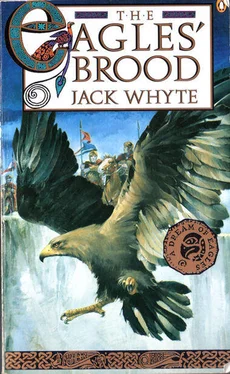Uther had chosen to believe otherwise. If the galloglas came, he said, they would come by sea, to anchor at the closest point to Lot's stronghold. Should that come to pass before his business with Lot was complete, he believed he could withhold their advance from the coast by using his bowmen to decimate the Ersemen as they attempted to scale the Cornish cliffs.
What he could not have known, however, was the degree of error in his expectations. He had invested Lot's ditched and dyked stronghold according to plan, but even before his engineers could start constructing their siege engines, word had come with the dawn from his unknown spy that the southern army was returning, having failed to bring the Saxons to battle.
That word was followed within hours by a belated warning that a fleet had landed to the north two days earlier, spilling an army that was short of food and was now thrusting southward to join Lot, replenishing its larders as it came. And then, early that same afternoon, another fleet of more than a hundred galleys had come into view from the north-west, converging on the single stretch of beach, not far from Uther's camp, that was not begirt by towering cliffs.
In the space of a few short hours, although through no real fault of his own, Uther had been outnumbered and outmanoeuvred. Immediately upon sighting the relieving fleet, he had summoned his bowmen back from the cliffs and called an immediate council of war, drawing up quick plans to strike south and surprise Lot's main army on the road along the coast, leaving Cornwall's deplorable king safe for the moment in the hands of his rescuers.
They had struck out for the south immediately, and Bassus had drawn the honour of commanding the rearguard. It was one of his own scouts, ranging far behind to spy on the enemy's progress, who had brought Bassus the news of the final blow to Uther's plans. This man, at great risk to himself, had approached Lot's stronghold again and remained hidden among the rocks on the hillside far above, to watch what might develop in the aftermath of Uther's departure. He had seen Lot ride to meet his new reinforcements from the sea, to join them and make off around the coast southward at great speed, the massive Erse galleys surging along under full oar power and sails spread to a following wind, forewarned and fully aware of Uther's strength and his line of march.
Shortly after receiving this information, and before the messenger could eat and ride on to warn Uther, Bassus's rearguard had been attacked and overrun by a heavy, fast- moving concentration of Hibernians. The news of Lot's escape by sea had" gone no further. The scout had been killed along with everyone else save Bassus, who had fallen apart from the main slaughter and had been left for dead.
He had lain unconscious all night long, and had struggled in and out of awareness for most of the following day. Only a short time before my arrival had he managed to pull himself out of the hollow where he lay and to attempt to find someone to help him. He had seen me coming, and had recognized me, but had been unable to call to me. Fortunately I had noticed him moving, and now he had passed on the warning, making it my responsibility: Uther Pendragon was headed blindly southward, through rough and roadless terrain that made for heavy, slow going, into a confrontation that he thought would give him the advantage of surprise. Instead, he would find Lot waiting for him with two armies and the sea at his back, while a third army followed hot on Uther's own heels. Uther and his entire force would be annihilated.
Even as I listened, hearing the tortured frailty of his voice and the shallowness of his breathing, I was deciding that I would have to leave young Bassus there alone. He was dying, and rapidly—of that I had not the slightest doubt. But I had to be on my way immediately. I could not afford the luxury of waiting with him even for a short time, and both of us knew that. He would die, and I would—I must—leave him to handle it alone. My personal feelings for Uther were of no importance now, beside the imperative need to find him in time to warn him to turn his army and the men of Camulod around and away from the fate that awaited them.
Bassus finished speaking and fell backward, his eyes closed. I knelt above him, the fingers of one hand grasping his wrist, feeling the still-beating pulse. Sighing, and feeling wretched, I began to rise to my feet and as I did so a cloud of fluttering, fighting crows and gulls swept along the hillside, their jarring voices tearing at my ears. The eyes beneath me snapped open and the dying man followed me flight of the birds with wide, horror-filled eyes. I bent forward and laid my hand on his forehead. It was cold and clammy. I felt his head move in a negative, his eyes still staring. He tried to say something else and I bent closer to hear. And then, in a voice so weak that I could barely make it out, he told me to go, but begged me to kill him first, not to let the crows at him while he still lived. A chilling rush of fear and revulsion swept over me. How could I kill him? He was my friend and had given me nothing but loyalty and obedience. How could I reward him by killing him?
And then, of course, the answer came to me in terms that I could not refute. I could not save him, nor could I remain with him until he died. The lives of too many others depended upon my speed and every moment was too precious now. But neither could I abandon him, leaving him to await, in terror, the arrival of the first filthy carrion crow to alight on his face and pluck out an eye while he was still alive. I wrestled with the truth of that for what seemed an eternity before I nodded silently to him. He read my expression correctly, nodding his own thanks in return. I stood erect, telling him to close his eyes. He did so, and I drew my long cavalry sword, placing its point carefully beneath the arch of his ribs, angling it upward. He drew one last, deep breath and held it, and I dropped, throwing my full weight onto the hilt of the sword, driving it deep into his heart. He convulsed, his legs kicked wildly once and then he was still.
I turned him on his face to hide his brown eyes from the crows, and then I piled what rocks I could find around him in a symbolic gesture of burial. Only then did I clean my blade, before transferring my saddle to my spare mount and riding off quickly without looking back, leading the black and the pack-horse. It was mid-afternoon.
Towards nightfall, I almost rode into disaster, coming upon a group of five mounted men riding towards me. Fortune dictated I should be almost completely screened from their sight at first, however, hidden by a fringe of branches on the last trees of a small copse of stunted hawthorn through which I had been riding, following a narrow, well-worn path. They were approaching the copse, talking among themselves and clearly expecting to meet no one. All five wore brown tunics with a black boar painted or embroidered on their chests. I knew after only the quickest glance around me that I had no chance of hiding from them. There was nowhere to hide, and if I tried to run they would hear me. They were close enough to see me plainly already, if they had but looked. I had no choice.
The first man was flung from his horse's back by the force of my arrow before his closest companion realized anything had happened. Stunned by the suddenness of his friend's death, the fellow made the mistake of turning in his saddle to see what had happened to him. My second arrow struck him in the neck, piercing the stretched skin beneath the point of his backward-craning jaw and knocking him, too, over his horse's rump. I killed a third man before the two remaining cursed and broke apart, to right and left, only one of them having seen me, finally, among the branches ahead of them. I snapped a shot at him but missed, and then they were away from me, galloping their horses at top speed. I swung my own mount around and headed back the way I had come, pulling off the path eventually and heading deeper into the copse, to my right. I heard voices behind me, and then a horn blowing. They would be close behind me, I knew, for one of them had seen, even in his fright, that I was alone.
Читать дальше









